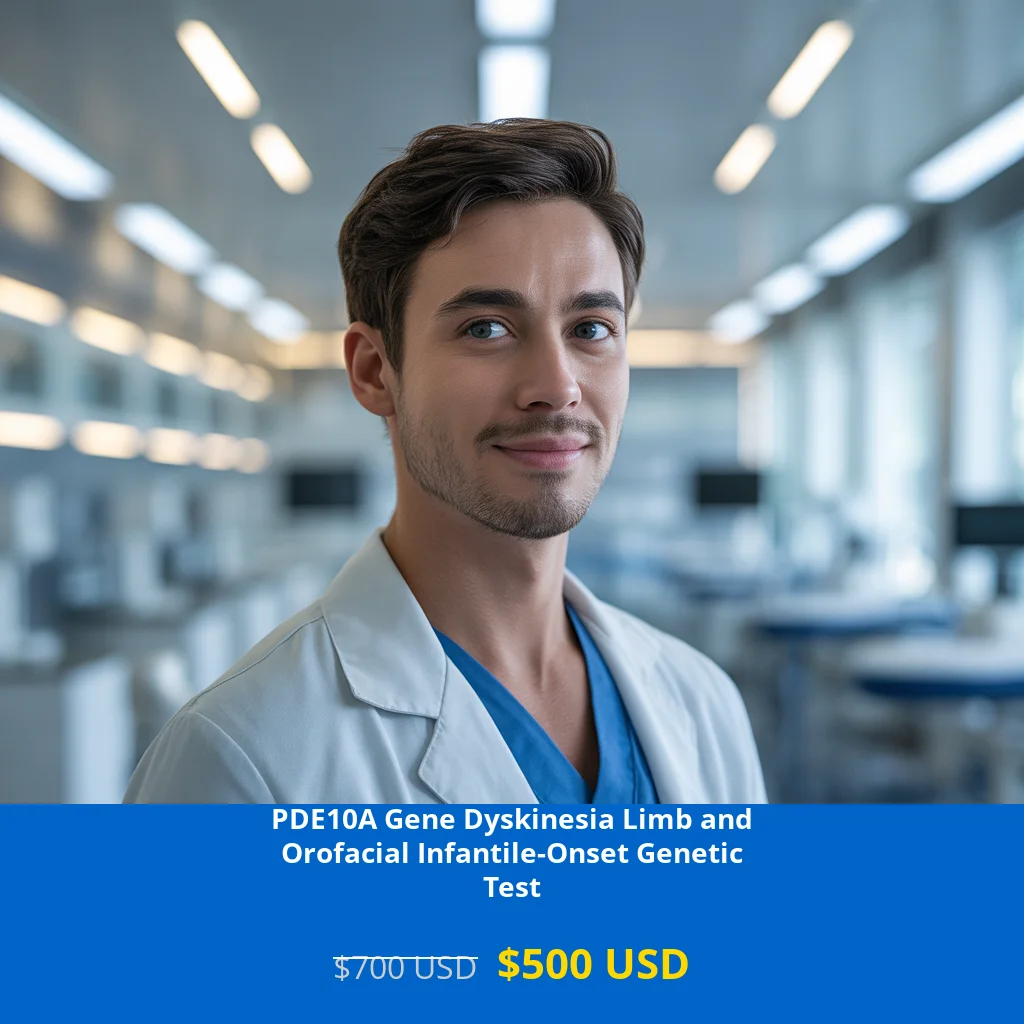PDE10A Gene Dyskinesia Limb and Orofacial Infantile-Onset NGS Genetic DNA Test
Understanding PDE10A Gene Dyskinesia
The PDE10A Gene Dyskinesia Limb and Orofacial Infantile-Onset NGS Genetic DNA Test represents a breakthrough in neurological genetic diagnostics. This specialized test focuses on identifying mutations in the phosphodiesterase 10A (PDE10A) gene, which plays a crucial role in regulating cyclic nucleotide signaling in the basal ganglia—the brain region responsible for movement control.
Infantile-onset dyskinesias involving limb movements and orofacial regions are rare neurological conditions that can significantly impact a child’s development and quality of life. Early and accurate diagnosis through genetic testing is essential for implementing appropriate treatment strategies and understanding the long-term prognosis.
What This Test Detects
Our advanced NGS (Next-Generation Sequencing) technology specifically targets:
- Pathogenic variants in the PDE10A gene associated with movement disorders
- Point mutations, insertions, and deletions affecting gene function
- Genetic markers for infantile-onset chorea and dystonia
- Variants impacting basal ganglia signaling pathways
- Inheritance patterns for family planning considerations
Who Should Consider This Test
This genetic test is recommended for infants and children presenting with:
- Involuntary limb movements appearing in infancy
- Orofacial dyskinesias affecting mouth and facial muscles
- Choreiform movements (dance-like, irregular motions)
- Dystonic posturing or muscle contractions
- Family history of similar movement disorders
- Unexplained developmental delays with movement abnormalities
- Suspected genetic movement disorders without clear diagnosis
Key Benefits of PDE10A Genetic Testing
- Accurate Diagnosis: Provides definitive genetic confirmation of PDE10A-related dyskinesia
- Early Intervention: Enables timely treatment planning and management strategies
- Family Planning: Identifies inheritance patterns for future family planning decisions
- Treatment Guidance: Informs medication choices and therapeutic approaches
- Prognostic Information: Helps understand disease progression and long-term outcomes
- Research Contribution: Advances scientific understanding of rare movement disorders
Understanding Your Test Results
Your genetic test results will be carefully interpreted by our team of board-certified geneticists and neurologists:
Positive Result
A positive result indicates the presence of a pathogenic variant in the PDE10A gene. This confirms the genetic basis of the movement disorder and allows for:
- Targeted treatment approaches
- Family member testing recommendations
- Long-term management planning
- Connection with support networks
Negative Result
A negative result means no pathogenic variants were detected in the PDE10A gene. This may indicate:
- Other genetic causes for the movement disorder
- Need for additional genetic testing
- Non-genetic factors contributing to symptoms
Variant of Uncertain Significance (VUS)
Sometimes, genetic changes are identified whose clinical significance is unknown. In such cases, we provide:
- Detailed explanation of the finding
- Recommendations for family studies
- Guidance for ongoing monitoring
- Updates as new research emerges
Test Pricing and Details
| Test Feature | Details |
|---|---|
| Test Name | PDE10A Gene Dyskinesia Limb and Orofacial Infantile-Onset NGS Genetic DNA Test |
| Discount Price | $500 USD |
| Regular Price | $700 USD |
| Turnaround Time | 3 to 4 Weeks |
| Sample Type | Blood, Extracted DNA, or One Drop Blood on FTA Card |
| Testing Method | Next-Generation Sequencing (NGS) Technology |
Pre-Test Requirements
Before scheduling your test, we recommend:
- Complete clinical history documentation
- Genetic counseling session to discuss implications
- Family pedigree chart development
- Discussion of potential outcomes and next steps
Nationwide Testing Availability
We have convenient testing locations across the United States, including major metropolitan areas such as New York, Los Angeles, Chicago, Houston, Phoenix, Philadelphia, San Antonio, San Diego, Dallas, and San Jose. Our state-of-the-art laboratories ensure consistent, high-quality results regardless of your location.
Take the Next Step Toward Diagnosis
If you suspect your child may have PDE10A-related dyskinesia, don’t wait to get answers. Early genetic diagnosis can make a significant difference in treatment outcomes and quality of life. Our team of genetic specialists is ready to guide you through the testing process and provide comprehensive support.
Call us today at +1(267) 388-9828 to schedule your genetic counseling session and book the PDE10A Gene Dyskinesia Test. Take control of your child’s neurological health with definitive genetic answers.







